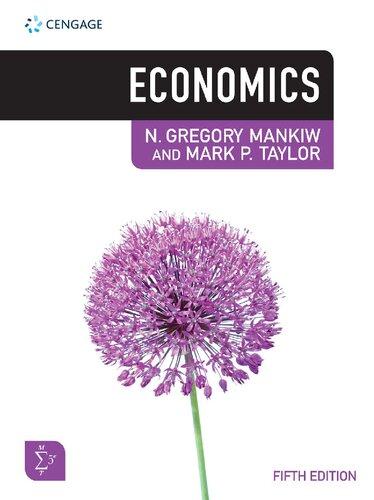There is no shortage of people, both economists and non-economists, who are keen to highlight how the
Question:
There is no shortage of people, both economists and non-economists, who are keen to highlight how the standard theory as outlined in the first part of this chapter is ‘dead’ and should be consigned to history. Some quotes on the subject include the following.
Nicholas Hanley, Professor of Environmental Economics at the University of St Andrews introduces an article in The Conversation thus: ‘For years, economists and psychologists have argued about whether the standard model that economists use to explain how people make decisions is correct.’ Also in The Conversation, Brendan Markey-Towler, Industry Research Fellow at the Australian Institute for Business and Economics and School of Economics, The University of Queensland, comments on the high price that Apple charges for its latest iPhone and notes that ‘The answer comes down to behavioural economics.’ Derek Thompson writing in The Atlantic runs the headline: ‘Richard Thaler wins the Nobel Prize for Economics for Killing Homo Economicus.’ He goes on to note: ‘Renowned for his use of data to observe and predict how people behave in the real world, Thaler’s career has been a lifelong war on Homo economicus, that mythical species of purely rational hominids who dwell exclusively in the models of classical economic theory.’ Richard Partington writing in The Guardian on Thaler winning the Nobel Prize notes: ‘Unlike the field of classical economics, in which decision-making is entirely based on cold-headed logic, behavioural economics allows for irrational behaviour and attempts to understand why this may be the case.’
However, there are some who note that the standard model can provide some illumination on human decision-making. Dean Pearson, National Australia Bank’s head of behavioural economics, writes in the Sydney Morning Herald that many people who complain of being short of time could benefit themselves by releasing valuable time spent on tasks which other people could do by paying for mundane household tasks to be done for them, such as mowing lawns and cleaning the house. Doing so would release time to spend doing things we really enjoy and value.
This could be interpreted as a classic case of a consumer changing their decision-making to improve utility and doing the best they can, given their circumstances.
Consider how you chose your university.
You were no doubt constrained by a number of factors, money, qualifications, ability to travel, accommodation and so on. You might also have considered several different course types and universities before arriving at your choice. To what extent did your decisions reflect the idea of a rational human doing the best they can, given their circumstances, and to what extent was your decision based on behavioural traits alone? You may not have used the terminology we have introduced in this chapter in your decision-
making, but is there any part of the model of consumer behaviour we have presented which reflects your behaviour in choosing your university?
Critical Thinking Questions
1 Would you consider this article to be a defence of the standard economic model or a balanced view on the merits of both the standard model and behavioural theories of consumer behaviour?
2 Consider the quote by Nicholas Hanley. Comment on the use of the word ‘correct’ in the context of the quote.
3 When a company like Apple releases a product and charges a very high price for it, the suggestion by Brendan Markey-Towler is that this can be explained by behavioural economics. Present an argument that the high price for a product like a smartphone could equally be explained by the standard economic model.
4 Richard Thaler, the 2017 Nobel Prize winner for Economics, has been referred to as ‘one of the fathers of behavioural economics’. In the quotes presented in the article, he is presented as spending his life being ‘at war’ with homoeconomicus, and by implication with economists who subscribe to the standard economic model. What role does the language used by the writers in their quotes play in framing the arguments being presented? (You might want to get hold of a copy of Thaler’s book Misbehaving and judge for yourself whether he has spent his entire career ‘at war’ with the economics profession.)
5 Consider the comment regarding outsourcing mundane domestic chores to someone else and releasing time, and your own decision-making process in choosing a university (in choosing a university you are a consumer of higher education). Comment on the extent to which these two examples reflect elements of the standard economic model or whether they both reflect behavioural economic explanations of consumer behaviour. Is your answer an ‘either/or’? What light do you think your analysis sheds on the debate between the standard model and other explanations of consumer behaviour?
Step by Step Answer:






